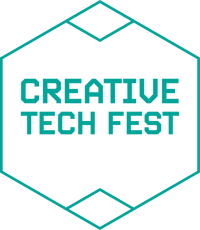Creative Tech Festival
26 Feb / 13:30 - 15:00 / online
_Ideas Exchange
Will robots replace Basildon's workforce?

-
How will automation and AI transform the way we work in Basildon?
-
Are robots a threat to jobs, or the key to unlocking growth?
-
What does an automated future mean for your business?
What it’s about
Will automation and AI reshape Basildon’s economy? Will robots replace human workers, or will they create new opportunities? In this insightful panel discussion from Creative Tech Fest 2025, industry experts, educators, and futurists explore how businesses in Basildon — and beyond — are adopting AI, robotics, and automation, and what this means for jobs, skills, and education.
What the aims were:
- Understand how automation is reshaping workforce dynamics, recruitment and skills
- Explore the risks and opportunities that automation presents to businesses and employees
- Engage in meaningful dialogue with local businesses to share challenges and strategies
- Develop a clearer plan for adapting to workforce changes and opportunities in an automated world
Topics covered:
✅ How businesses are investing in AI & automation — and the risks they face
✅ The impact on future jobs — which skills will be in demand?
✅ The growing skills gap — why companies are struggling to hire the right talent
✅ How schools, colleges & universities must adapt to prepare the workforce of tomorrow ✅ The role of critical thinking and creativity in an AI-driven world
Key takeaways:
- AI and automation will change jobs, not eliminate them — but workers must adapt.
- Companies need to rethink recruitment & training — entry-level hiring is declining.
- Educators must teach AI literacy & critical thinking, not just coding.
- Basildon is a leader in automation, but must invest in human-AI collaboration.
🔗 Watch now to understand how AI is reshaping the workforce — and what businesses, educators, and individuals must do to prepare.
Guest speaker
.png?width=350&height=350&name=Untitled%20design%20(17).png)
Chris Middleton is one of the UK’s leading business and technology journalists, an expert in robotics and AI and an experienced public speaker. With a career spanning multiple books, editorial roles and media appearances, Chris specialises in the societal, cultural and policy implications of emerging technologies, including robotics, AI and autonomous systems. He has advised government bodies, contributed to leading publications and even owns a collection of humanoid robots that he hires out to schools and events.
Chris will explore the real-world cultural, ethical and policy implications of robotics and AI, offering thought-provoking insights into the future of these transformative technologies.
Our expert panelists
.png?width=300&height=301&name=Untitled%20design%20(1).png)

.png?width=300&height=300&name=Untitled%20design%20(10).png)
.png?width=300&height=300&name=Untitled%20design%20(16).png)
Dr Shabnam Sadeghi Esfahlani is an Associate Professor in Robotics at Anglia Ruskin University and Deputy Leader of the BORI research group. A Chartered Engineer and Senior Fellow of the Higher Education Academy, she specialises in robotics, AI, mechatronics, and VR. Her pioneering projects, including the SROBO ground robot and assistive robotics, focus on real-world applications.
With over 40 publications, editorial roles, and funding from Innovate UK and KTP UK, Shabnam is a leading researcher driving innovation in robotics and AI.
Steve Wells is an international speaker, futurist, strategist and facilitator. He delivers thought-provoking keynotes and strategic foresight sessions, helping clients navigate the future of life, business and society. His expertise lies in identifying the key factors driving innovation, growth and disruptive change. He explores the impact of AI, robotics, augmented and virtual reality and the Internet of Things, as well as the mindset shifts and leadership skills needed to thrive in an evolving world.
Steve is a co-editor and contributing author of seven books, including Aftershocks and Opportunities and A Very Human Future, offering deep insights into the potential of emerging technologies.
Dr Sharon Sibanda is Head of Computing for the University of Essex Online. She oversees all programmes offered at both undergraduate and postgraduate level. Sharon’s background is wide-ranging and includes teaching and managing qualifications in Computer Science within secondary and higher education institutions for 20 years. She has led in the development and launch of undergraduate and post graduate degree programmes in Digital Technology, AI and Data Science. She is currently a member of the Association for Computing Machinery (ACM) and her research interests lie in understanding the role of affective computing in improving learner outcomes in computer science education.
Rose Tighe is a product and innovation leader with extensive experience in broadcast, communications technology, and digital platforms across B2B and B2C markets. She has led product teams at Sky, Amazon, and Trustpilot, and is committed to making innovation more accessible and inclusive.
As Co-Chair of Innovate UK’s Immersive Tech Network ED&I Group and a BIMA Innovation Council member, Rose advocates for greater diversity in emerging technology. She co-organises Brighton AI, and recently launched a No Code network to help non-technical individuals and small businesses build digital solutions.


